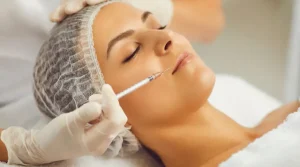Key Takeaways:
- Annual skin cancer screenings are essential for early detection and prevention of skin cancer.
- Self-exams can help monitor changes, but seeing a dermatologist ensures professional evaluation.
- Those at risk include individuals with fair skin, excessive sun exposure, or a family history of skin cancer.
- Screenings are preventive and covered by many insurance plans.
What is an Annual Skin Cancer Screening?
An annual skin cancer screening is a thorough examination of your skin conducted by a dermatologist to detect any signs of skin cancer. The dermatologist checks for unusual moles, growths, or suspicious lesions during the screening. If abnormalities are found, they may perform a biopsy to determine if the growth is cancerous. These screenings are essential in detecting skin cancer in its early stages when it is most treatable.
Why is Skin Cancer Screening Important?
Skin cancer is the most common type of cancer in the United States, and early detection is critical for successful treatment. Skin cancers, including melanoma, basal cell carcinoma, and squamous cell carcinoma, can develop rapidly and spread to other parts of the body. Detecting skin cancer early through regular screenings improves the chances of treating it before it becomes more advanced and potentially life-threatening.
Who is at Risk of Skin Cancers?
While anyone can develop skin cancer, certain factors increase the risk:
1. Fair Skin: Individuals with lighter skin, hair, and eyes are more prone to skin damage from UV exposure.
2. Excessive Sun Exposure: People who spend much time in the sun, particularly without adequate protection, are at higher risk.
3. Tanning Beds: Using tanning beds significantly increases the risk of skin cancer, especially in younger individuals.
4. Family History: A family history of skin cancer, especially melanoma, can increase your risk.
5. Weakened Immune System: People with compromised immune systems, such as those who have undergone organ transplants, are at greater risk.
6. Aging: The risk of developing skin cancer increases with age, especially after 50.
7. Frequent Sunburns: Individuals who have experienced multiple blistering sunburns are at greater risk of skin cancer.
8. Presence of Moles: People with many or atypical moles are more likely to develop melanoma.
9. Geography: Those living in sunny or high-altitude regions are at higher risk due to increased UV exposure.
10. Previous Skin Cancer: If you’ve had skin cancer before, you’re more likely to develop it again.
Should I Perform Skin Self-Exams?
Yes, self-exams are a critical component of skin cancer prevention. Regularly examining your skin allows you to monitor changes in moles, growths, or other skin abnormalities that could indicate cancer. Follow the ABCDE rule to assess moles for signs of melanoma:
- Asymmetry: One half of the mole doesn’t match the other.
- Border: The edges are irregular, ragged, or blurred.
- Color: Uneven colors, including shades of black, brown, or tan.
- Diameter: A mole more prominent than a pencil eraser may be concerning.
- Evolving: Any change in size, shape, or color.
While self-exams are helpful, they do not replace a professional skin check by a dermatologist. A doctor’s trained eye can detect issues you may overlook.
Protect your skin and your health! Take the first step in skin cancer prevention with regular screenings, early identification, and advanced treatment options. Schedule your skin cancer screening today and stay proactive in safeguarding your well-being!
10 Reasons Why You Should See a Dermatologist for a Skin Check
1. Professional Expertise: Dermatologists are trained to recognize even the most minor signs of skin cancer that may escape your notice.
2. Early Detection: Regular skin checks allow for early detection of skin cancer, significantly improving treatment success.
3. Biopsy Capabilities: A dermatologist can immediately perform a biopsy for further investigation if something suspicious is found.
4. Personalized Advice: Dermatologists provide personalized skincare advice, including sunscreen use and skin damage prevention tips.
5. Comprehensive Examination: Dermatologists thoroughly examine areas that are difficult to see, such as your back and scalp.
6. Identification of Non-Cancerous Growths: Not all skin irregularities are cancerous, and dermatologists can reassure you when moles or growths are benign.
7. Management of Risk Factors: Dermatologists can help you understand your personal risk factors and suggest measures to lower your chances of developing skin cancer.
8. Peace of Mind: Regular check-ups offer peace of mind, knowing that your skin health is being professionally monitored.
9. Follow-Up Care: If you have a history of skin cancer or suspicious lesions, dermatologists offer follow-up appointments to monitor your condition.
10. Prevention: Dermatologists can recommend preventive treatments, such as cryotherapy or topical medications, to remove precancerous lesions before they develop into cancer.
Is Skin Cancer Screening Considered Preventive?
Skin cancer screenings are considered a preventive measure, and many health insurance plans cover these screenings as part of routine care. Preventive screenings aim to catch skin cancer in its earliest stages, allowing for quicker, less invasive treatments and better outcomes. By identifying potential skin cancers early, dermatologists can reduce the likelihood of cancer spreading or becoming more difficult to treat.
FAQ:
1. How often should I get a skin cancer screening?
It’s recommended that adults have an annual skin cancer screening, mainly if they are at higher risk due to factors like fair skin, sun exposure, or family history. However, depending on your risk factors, your dermatologist may suggest more frequent screenings.
2. How long does a skin cancer screening take?
A typical skin cancer screening takes about 10-30 minutes, depending on the thoroughness of the exam and the number of suspicious moles or lesions.
3. What should I expect during a skin cancer screening?
During screening, your dermatologist will carefully examine your skin from head to toe, looking for unusual moles, spots, or growths. They may take a biopsy for further testing if they find anything suspicious.
4. Can skin cancer screening detect all types of skin cancer?
While skin cancer screenings are highly effective in detecting most types of skin cancer, including melanoma, basal cell carcinoma, and squamous cell carcinoma, they may not detect skin cancers that develop in deeper layers of the skin. Regular monitoring and self-exams are also essential for spotting changes between screenings.
5. Are skin cancer screenings covered by insurance?
Most health insurance plans cover skin cancer screenings as a preventive measure, but it’s always a good idea to check with your provider to confirm your coverage.
6. What should I wear to a skin cancer screening?
Wear loose, comfortable clothing that can be easily removed. You’ll likely be asked to wear a gown so the dermatologist can thoroughly examine your skin.
7. Can I perform a skin cancer screening at home?
While self-exams are helpful, they are not a substitute for a professional skin cancer screening. Dermatologists are trained to identify even the subtlest signs of skin cancer you might miss.
8. How can I reduce my risk of skin cancer?
To reduce your risk of skin cancer, wear sunscreen with a high SPF, avoid tanning beds, wear protective clothing, and seek shade when the sun is strongest. Additionally, regular skin cancer screenings and self-exams are critical.
9. Is skin cancer treatable if caught early?
Yes, skin cancer is highly treatable when detected early. Treatments may include surgical removal, cryotherapy, radiation, or topical medications, depending on the type and stage of the cancer.
10. Should I be concerned about any new mole or growth?
Yes, any new or changing moles or growths should be evaluated by a dermatologist, especially if they exhibit signs like asymmetry, irregular borders, multiple colors, or increasing size.
Conclusion
Skin cancer is a serious yet preventable condition, and an annual skin cancer screening is one of the most effective ways to protect yourself. Whether at high risk or simply proactive about your health, seeing a dermatologist for a skin check can save your life. By catching skin cancer early, you increase your chances of successful treatment and can take steps to reduce your future risk. Don’t wait until it’s too late—schedule your annual skin cancer screening today to safeguard your health for years.
Ready to look, feel, and BE your best?
Visit Lasting Impression Medical Aesthetics in Fair Lawn, New Jersey, and let Dr. Roel Galope help you enhance your natural beauty with our personalized, comprehensive treatments. Schedule your consultation today and start your journey to a more confident you!





